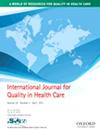多阶段、多中心开发和验证两个成熟度工具,评估 FlaQuM 共同创造路线图的实施情况
IF 2.7
4区 医学
Q2 HEALTH CARE SCIENCES & SERVICES
引用次数: 0
摘要
背景:作为新的佛兰德质量模式(FlaQuM)的一部分,为实现可持续的质量管理体系,制定了一个共同创造路线图,其中包括六个主要驱动因素和 19 个构建模块,为医疗机构提供指导。目前,还没有评估工具可用于根据共创路线图监控医院质量管理系统的实施情况。因此,我们旨在衡量医院实施 FlaQuM 共同创造路线图的成熟度。方法与 19 家医院共同设计的三阶段方法首先是确定范围,然后通过文献综述、内容专家(47 人)参与、内容专家参与的 20 个焦点小组(79 人)以及医疗质量管理人员参与的德尔菲回合(19 人)建立内容效度,以测试内容效度指数(CVI)。结构效度通过确认性因子分析进行评估,收敛效度通过斯皮尔曼 ρ 相关系数进行评估。结果如下基于现有的 17 种成熟度工具和内容专家的子组件,根据 FlaQuM 共同创造路线图的实施情况开发了两种成熟度工具:1)包含 52 个子要素的成熟度矩阵;2)包含 19 个陈述的共创扫描。总体量表-CVI 的相关性和清晰度分别为 93.3% 和 90.0%。在 119 名医疗保健专业人员的样本中,因子分析显示了 6 个因子的结构,在用于测试两种成熟度工具之间趋同有效性的 19 项假设中,16 项(84.2%)在统计学上有意义。结论通过在医院中使用这些综合成熟度工具,衡量 FlaQuM 共同创造路线图的实施情况并监测其随着时间推移的成熟度应该是可行的。这两种工具的结果应能描述医院实施共创路线图的现状,并以此为基础制定战略改进计划和下一步措施。本文章由计算机程序翻译,如有差异,请以英文原文为准。
A multi-phase, multi-centre development and validation of two maturity tools assessing the implementation of the FlaQuM co-creation roadmap
Background: As part of the new Flanders Quality Model (FlaQuM) towards sustainable quality management systems, a co-creation roadmap with six primary drivers and 19 building blocks that guides healthcare organisations has been developed. Currently, no assessment tool is available to monitor hospitals’ quality management systems implementation according to this co-creation roadmap. Therefore, we aimed to measure the maturity of the implementation of the FlaQuM co-creation roadmap in hospitals. Methods: A three-phase approach in co-design with 19 hospitals started with defining the scope, followed by establishing content validity through a literature review, involvement of content experts (n=47), 20 focus groups with content experts (n=79) and a Delphi round with healthcare quality managers (n=19) to test the content validity index (CVI). Construct validity was assessed by confirmatory factor analyses and convergent validity by Spearman’s ρ correlation coefficients. Results: Based on 17 included existing maturity instruments and sub-components of content experts, two maturity tools were developed according to the implementation of the FlaQuM co-creation roadmap: 1) a maturity matrix with 52 sub-components and 2) a co-creation scan with 19 statements. The overall scale-CVI varied between 93.3% and 90.0% in terms of relevance and clarity, respectively. In a sample of 119 healthcare professionals, factor analyses revealed a 6-factor structure and 16 (84.2%) of the 19 hypothesis for testing convergent validity between both maturity tools were statistically significant. Conclusion: Measuring the implementation of the FlaQuM co-creation roadmap and monitoring its maturity over time should be feasible by using these comprehensive maturity tools in hospitals. Results of both tools should be able to describe the current state of hospitals’ implementation of the co-creation roadmap as basis for strategic improvement plans and next steps.
求助全文
通过发布文献求助,成功后即可免费获取论文全文。
去求助
来源期刊
CiteScore
4.90
自引率
3.80%
发文量
87
审稿时长
6-12 weeks
期刊介绍:
The International Journal for Quality in Health Care makes activities and research related to quality and safety in health care available to a worldwide readership. The Journal publishes papers in all disciplines related to the quality and safety of health care, including health services research, health care evaluation, technology assessment, health economics, utilization review, cost containment, and nursing care research, as well as clinical research related to quality of care.
This peer-reviewed journal is truly interdisciplinary and includes contributions from representatives of all health professions such as doctors, nurses, quality assurance professionals, managers, politicians, social workers, and therapists, as well as researchers from health-related backgrounds.

 求助内容:
求助内容: 应助结果提醒方式:
应助结果提醒方式:


